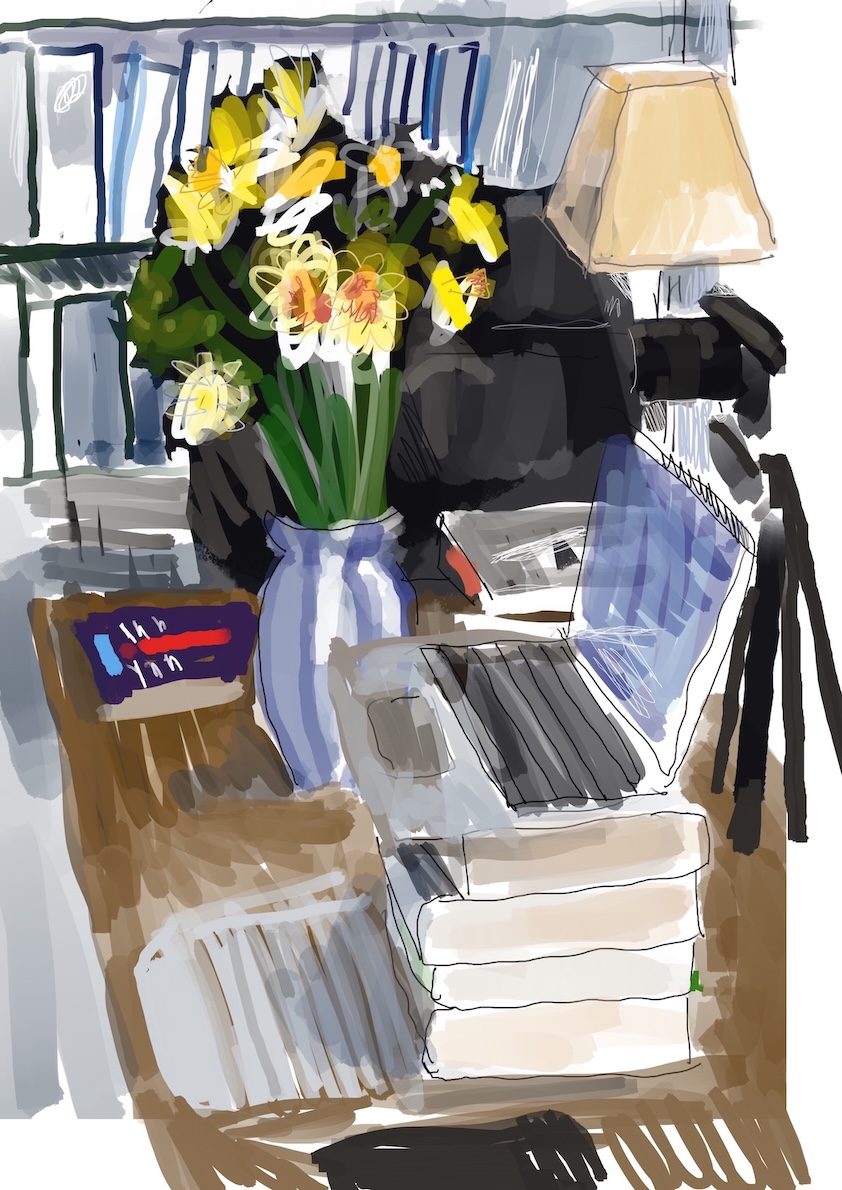Two women in an office. What do you notice?
|
Take a close look at these women, Audrey Heath (standing) and Alice May Spinks. For several years, while the men have been away fighting in the trenches, in France, these two have been running the office in London. Both women started work as secretaries. The war gave them a precious opportunity to do more, but with the war’s end their position became precarious: the economy was unstable, and the men came back. They could have reverted to being secretaries, if the company generated sufficient turnover to justify their salaries. Or they could have found different jobs elsewhere. Or they could have given up work altogether. Instead, they did something bold. In a male-dominated industry, Audrey and Alice set up on their own, as literary agents helping authors to navigate the complex world of publishing. In those early days, every client would have been precious, every contract a lifeline. Imagine the late nights poring over manuscripts, the anxious wait for responses from publishers, the thrill of securing a deal for a new author. For Audrey and Alice, each success would have been hard-won, a testament to their determination and skill. Their story reminds us that literary agents are not faceless gatekeepers, but individuals who have often taken significant risks to pursue their passion for literature. Many agents start their careers driven by a love of books and a desire to champion new voices. Their agency, A.M. Heath, grew and flourished over the decades, becoming one of the most respected in London. Its clients have included George Orwell, Hilary Mantel and Maggie O’Farrell. But hang on.That’s not really a picture of Audrey Heath and Alice May Spinks. To tell you the truth, I couldn’t find one. So I looked online for “women working in office, London, 1919” (or something like that). This picture, splattered with the logo of the copyright holder (the photo agency Alamy) is the best I could find. Why show the wrong people? Because I wanted to ask you to look carefully at a picture of agents and see them as – well, people like us, struggling to do good stuff in the world. It can be hard to think of agents that way, especially when you are preparing to send out a book proposal. At times like that, an agent can easily come to seem a fearful monster, perhaps even The Enemy. *** I’ve had five literary agents. I’m not boasting, I’m actually embarrassed – it makes me feel like I’ve done something (yet another thing!) wrong. Today, I’m happy to have an agent who is a friend first, agent second. That makes a big difference.
To a significant degree, I write my book proposals for him, Jaime. I want him to be amused / entertained / informed / moved or whatever. As well as writing for Jaime, I’m also writing for some other ideal reader - not least a potential publisher. Jaime knows that. I know that Jaime knows that, and Jaime knows that I know that he knows that – if you see what I mean. The point I want to drive home is that when you write a book proposal you’re writing something to persuade an agent that the agent will be able to persuade a publisher that the publisher will be able to persuade bookshops that the bookshops will be able to persuade readers to buy your book. Simple as that. Having said that.It’s not as if the process stops being nerve-wracking. Currently, Jaime has a book proposal from me, which he’s already sent out. Two days ago I exchanged text messages with him. He’d been encouraging me to keep sending stuff that might help the book’s cause – things he could use to nudge the publishers gently. Here’s part of the text exchange:
Thanks for reading. *** Write A Book Proposal LAST DAYI’ve been running free 45-minute Zooms throughout July. Thursday lunchtimes and early evening. The Zoom links are here: *** Patrons, I apologise for this hideous blunder yesterday: |
John-Paul Flintoff
📖 7 Books in 16 languages 📚 including: How To Change The World A Modest Book About How To Make An Adequate Speech.
Today’s date: 24 April 2025 Hello Reader Someone recommended a book in January, and I read it, and for three months I’ve been following its advice. I’m delighted I did. The book is called The 12-Week Year. The basic premise is that you can do as much in three months as you might otherwise achieve in a year, through a variety of small changes to your routines. Sounds a bit glib when I put it like that, but I found it extremely helpful. I tried explaining it to someone in real life the other...
Did you read yesterday’s email As well as drawing her - in her office in Wiltshire on Sunday - I took photos to use as reference as I continue to work on her portrait. “Her”? The former very senior editor at The Times, author and presenter of various flagship BBC radio programmes. The woman I mentioned in yesterday’s email. I hope you got that email. My intention is to send THIS email, which you’re reading now, only to people who received yesterday’s, and actively opted in to receive more in...
On Sunday I drove from London to Wiltshire. Just after Stonehenge I turned off the A303 and continued for a short distance until I came into a village. (Hello Reader. This is my newsletter.) There was scaffolding on the front of the first house and a cattle grid at the gates. I drove across, then along the driveway. I had come to start work on a new portrait. (I call this series Portraits of Interesting People in their Offices, or Poipitos.) The Interesting Person in question is a woman,...




